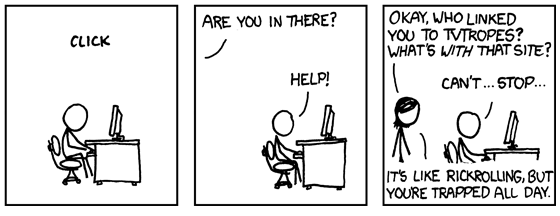About
TV Tropes is a wiki devoted to the documentation of “tropes”, which are tools of the trade for storytelling in movies, television shows, literature, and other forms of media. These conventions and devices are used in all forms of fiction, and should not be confused with clichés.
Tropes are devices and conventions that a writer can reasonably rely on as being present in the audience members’ minds and expectations. On the whole, tropes are not clichés. The word clichéd means “stereotyped and trite.” In other words, dull and uninteresting. We are not looking for dull and uninteresting entries. We are here to recognize tropes and play with them, not to make fun of them.[1]
The website is much like a Wikipedia for television and literature. The most striking differences is that there is no need for citations, and they clearly state on the website[4] that “There is No Such Thing as Notability”, which means they consider all works to be notable.
The website has a reputation for being addictive, often resulting in users opening many tabs from clicking on the many blue links on the pages. The site may also cause viewers to analyze fiction more than they normally would, and look at media from a more critical point of view.[3]
History
TV Tropes launched in April of 2004, and began as a fan site for Buffy the Vampire Slayer, pointing out tropes in that show alone.[5] The site quickly expanded to include hundreds, and eventually thousands of other entries. Eventually the site branched out to include other forms of media, such as film, literature, video games, and comics.[2]
In the Winter of 2014, Site Creator Fast Eddie resigned from the site and placed 2 admins in his place; Drewski and Icdtr [16]. At the same time, TV Tropes has created a Kickstarter campaigned witch has been successful, receiving $105,186 from over 3000 backers.[17] As of January 2015, the site has changed its layout. Some users compared it to Facebook’s design, other hate the new layout but the majority of the donors enjoyed the new aesthetic.
Articles
Most pages on TV Tropes focuses on a single trope. The article usually begins with quotations related to the topic before defining the trope. This is followed by a series of organized folders filled with examples of each trope from a variety of media.
Some pages do not focus on a trope at all, but deal with a story, movie or series. These pages typically consist of a brief synopsis of the show, its main plot and characters, and are followed by a list of tropes that are included in the work.
Spoilers are covered up with white block text, but this feature can be disabled by creating an account and changing your profile settings.
Meme-Related Articles
TV Tropes often references Internet memes with articles on memetic mutation[9], fountain of memes[10], memetic badass[11], Memetic Sex God[12], YouTube Poop[13], Internet[14], and Know Your Meme.[15]
Traffic
As of July TV Tropes has an Alexa[6] ranking of 3,748, a Compete[7] ranking 2,700, and a Quantcast[8] ranking of 3,743.
Search
Search queries for “tv tropes” and “tvtropes” picked up late 2006, and reached their highest spike in July of 2009.
External Links
[2]Wikipedia – Article on TV Tropes
[3]TV Tropes – TVTropes Will Ruin Your Life
[4]TV Tropes – There Is No Such Thing As Notability
[5]Semantic Web – From Mary Sue to Magnificent Bastards: TV Tropes and Spontaneous Linked Data – Kurt Cagle
[6]Alexa – tvtropes.org
[7]Compete – tvtropes.org
[8]Quantcast – tvtropes.org
[9]TV Tropes – Memetic Mutation
[10]TV Tropes – Fountain of Memes
[11]TV Tropes – Memetic Badass
[12]TV Tropes – Memetic Sex God
[13]TV Tropes – YouTube Poop
[15]Tv Tropes – Know Your Meme
[16]Tv Tropes Forum – Big Things Happening on TV Tropes
[17]Kickstarter – The TV Tropes Revitalization Project
